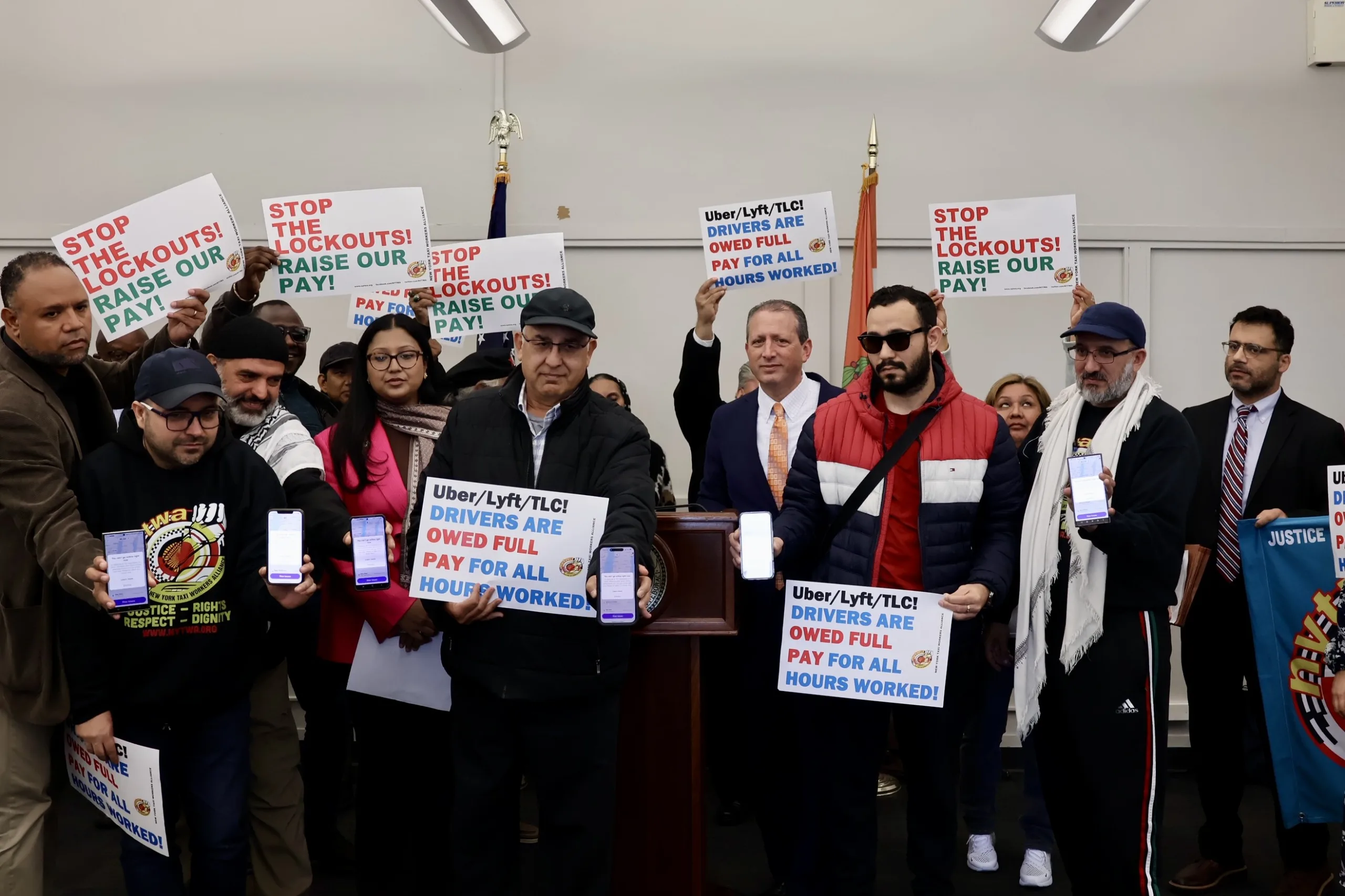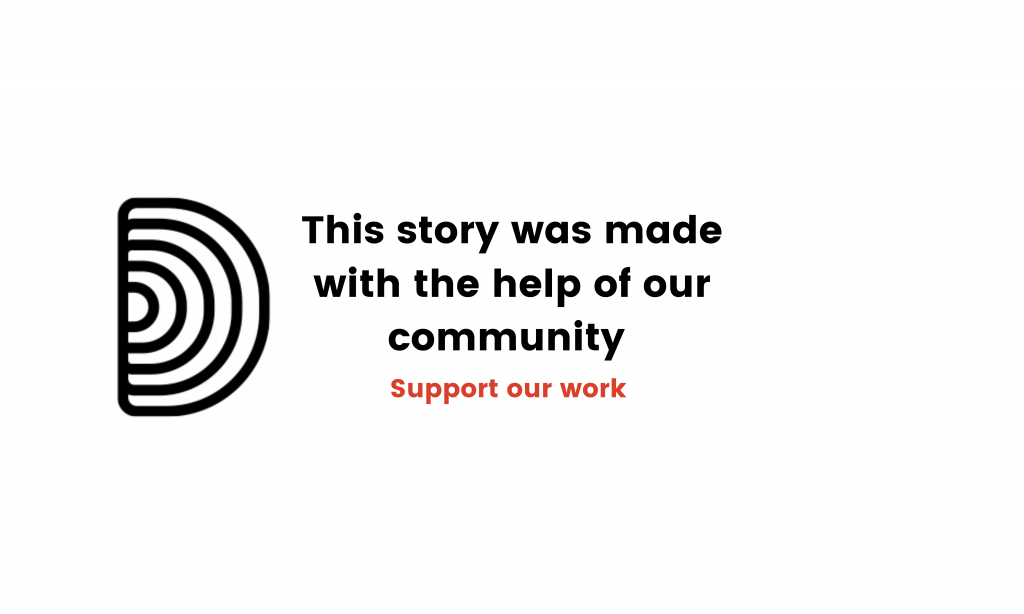
This story was was published in collaboration with Telemundo News.
In mid-November, Brooklyn resident Xochitl, a 30-year-old Mexican mother, received a message in the WhatsApp group chat for her son’s soccer team that made her stop in her tracks. The group chat had been created by parents during the summer to share resources, match times, or news relating to their childrens’ team.
The message was not related to soccer at all.
“CHRISTMAS HELP AVAILABLE $800 DOLLARS 2021. Click in the link above to send your application,” the message said.
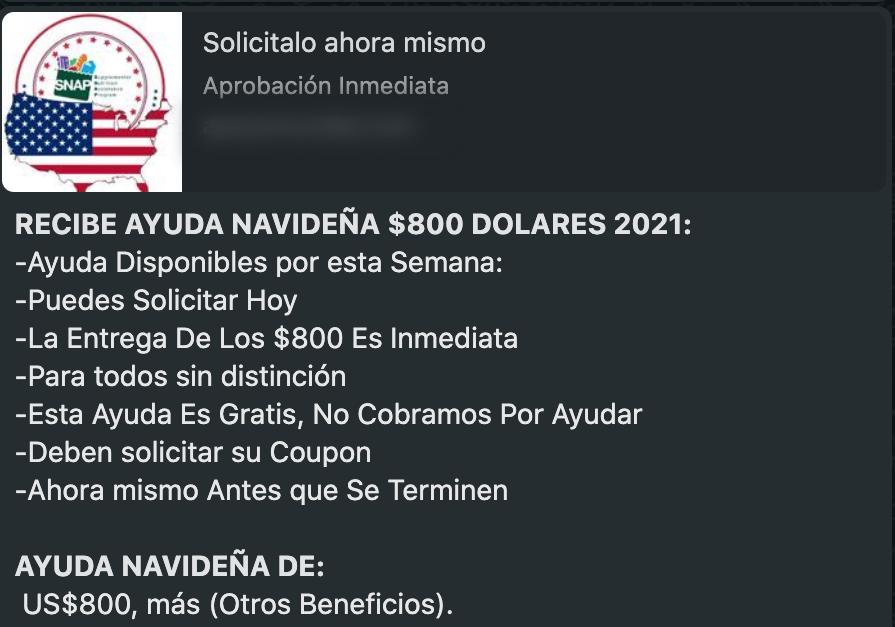
While Xotchil did not click on the link, not everyone who received the message was as reluctant as her.
This message was part of the most recent fraudulent campaign that has circulated in undocumented community groups on WhatsApp. As the pandemic started, the number of scams shared within the Spanish-speaking community increased along with the need for help.
Xochitl alerted Documented via our WhatsApp service, shortly after she received the message. Documented partnered with Telemundo to investigate where these scam messages targeting immigrants were coming from and we found that many originate outside the country, and use terms related to real on-going programs with the goal of making profits from advertisements that pay small amounts of money for each click.
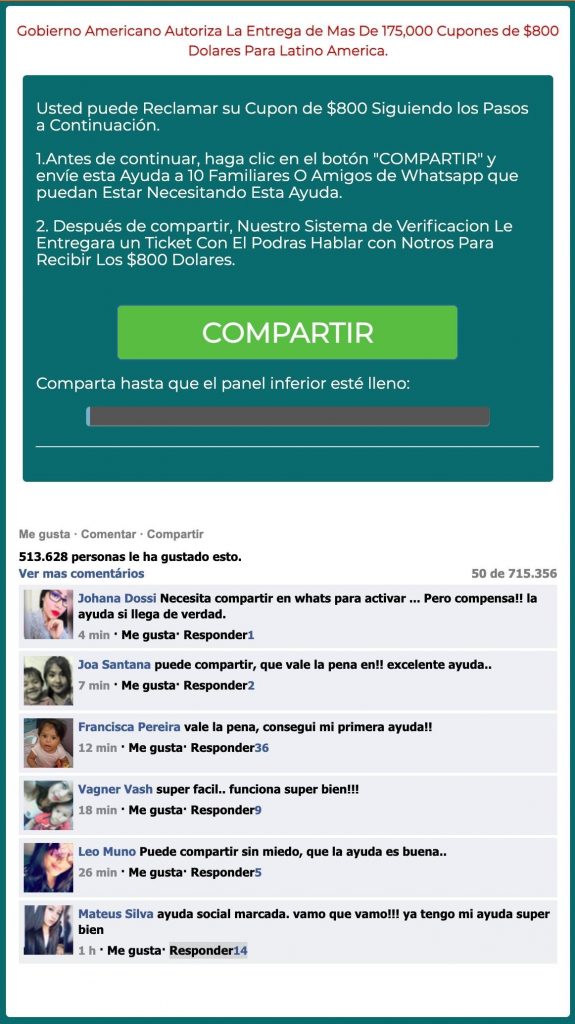
We analyzed more than 25 messages from our WhatsApp community members who were told to “share this help” with ten friends and family members so that they, too, could apply for financial assistance that does not exist.
One of the fraudulent campaigns mimics the wording of the Excluded Workers Fund (EWF), which is a New York State program that provided financial assistance of up to 15,600 to 130,000 New Yorkers previously excluded from unemployment benefits or Covid assistance programs. This included immigrants without legal statuses.
“They are taking advantage of the people. Many in the community thought that the Excluded Workers Fund was not real at the beginning, and ended up applying late. They don’t want that to happen now, so they apply right away because they don’t want to lose that help,” Xochitl said. She does not know the person who sent it, but added that “many left the group chat after the message was delivered.”
Like Xotchil, many community members told us that the messages had been sent to them in WhatsApp groups or by some of their friends, who, supposedly, had to share it with ten people so that they could have a higher chance of receiving the money.
Carmen, a 39-year-old Dominican who immigrated to the Bronx six years ago, said that she had received it from her aunt. “I blocked her because I do not like fraudulent things,” she said.
Scam messages that never die
This is not the first time that campaigns masquerading as the Excluded Workers Fund have emerged. In September, the Fund the Excluded Workers coalition, which consists of more than 100 community-based organizations, alerted the community about a website that was pretending to be them and was asking for donations to “continue their efforts.”
María Orellana, 49, who has been living in New York since 2010, also received a similar message to the one that Xotchil received. The link that she received had been created in August of this year, the same month that the EWF program was launched.
“The government is giving a new bonus, and purchase orders for everyone that has been vaccinated. If you have received the vaccine, register to receive the new assistance card for free.”
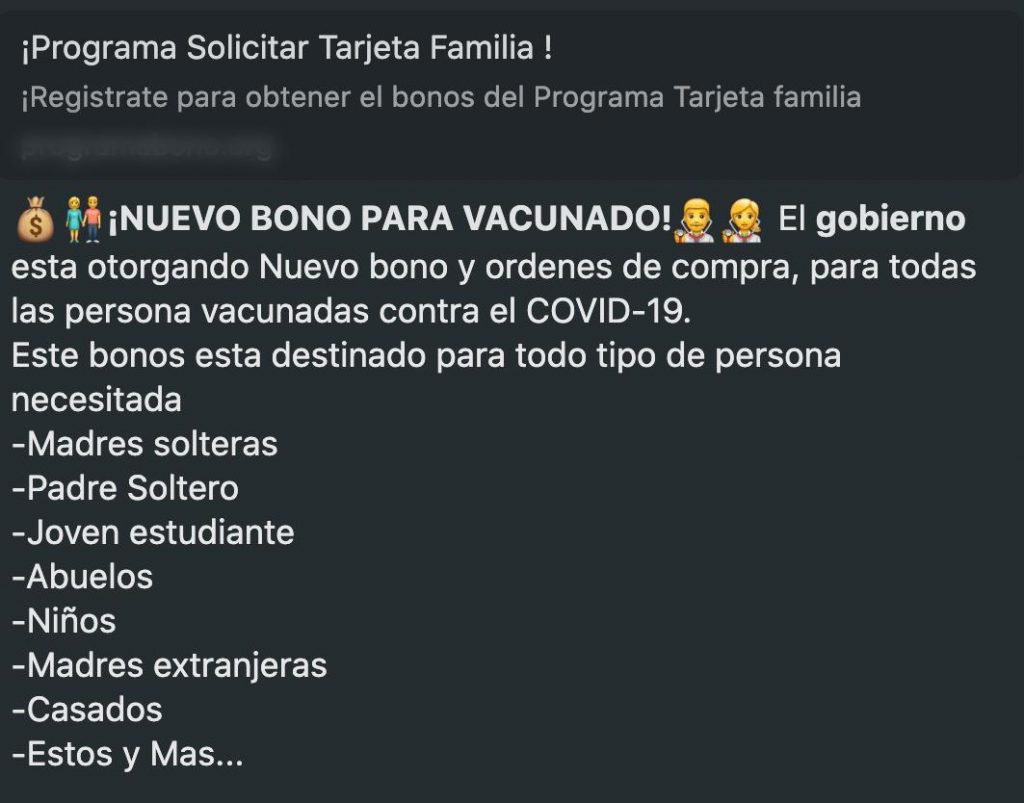
Orellana received this message, in Spanish that had spelling and syntax errors, from her friend at the beginning of October. When she saw it, she thought she qualified as she had been vaccinated earlier in the summer. She needed the assistance because she had missed out on the EWF.
She clicked on it. And then she became skeptical.
“At the beginning, I thought it was another stimulus program. I googled it and the name came up, so I assumed it was real. As I started to put in my information, they asked me to share the link with ten other people. That is when I realized that ‘this was not real,” she said. She had not been able to apply for the EWF because her consular ID from El Salvador did not arrive on time, she explained.
Orellana was one of the first people who contacted Documented regarding these scam messages that targeted Spanish-speaking immigrants in the state of New York. The days following her messages, we started to receive the same messages from multiple people. The messages used keywords that matched or related to the official programs to trick people, with the objective of piling up as many shares and clicks as possible to make a profit per click or, in some cases, steal credit card information.
“The safety and security of our users and their personal messages is really important to us which is why we protect them with end-to-end encryption,” said a WhatsApp spokesperson to Documented. “However, just like regular SMS or phone calls, it’s possible for other WhatsApp users who have your phone number to contact you,” they added.
Immigrants are not the only demographic being targeted. According to data collected by the Federal and Trade Commission (FTC), whose principal mission is the enforcement of civil U.S. antitrust law and the promotion of consumer protection, there has been an increase in complaints about fraud and identity theft since before the pandemic. In the past four years, they have increased more than 72%.
In fact, by August of this year, there were 1,520,295 complaints submitted– showing a 50% increase from the same time period in 2020.
Argentine native María Alejandra Suárez, 45, is part of a WhatsApp group that shares resources, like job opportunities or tips, for immigrants who work in the cleaning industry in New York City. She received the same message as Orellana from some of the other members. She knew that it was fake right away because she had seen some similarities with the messages that had been spread at the beginning of the pandemic.
“Those people don’t have anything to do. They bother those who have to work. There is so much necessity, so I don’t know what they are trying to do with this.” Suaréz also said that she advised the other members to not interact with the message and not to spread it. She said that the person who sent it apologized and commented that she had sent it in good faith.
A business model
Documented and Telemundo News looked into at least 25 unique scam messages, sent multiple times, since the beginning of the pandemic. All of the messages offered help for immigrants and linked to a webpage that had ads embedded in them. Basically, with every visit and reload to the website, the individual or organization behind the scheme would make a small amount of money.
When doing a comparative analysis of the number of visits to the five websites, from which we received most of the reports, we found that they received 57,597 visits during the last year, which, according to conservative calculations based on the market price, translates into at least $ 2,000 of Profits.
While some of the sites redirected people to places imitating news sites, others took users to questionnaires that asked for their personal information, such as phone number, name, email, and physical addresses, which is dangerous to share — especially for immigrants without documentation.
The team at Documented and Telemundo were able to confirm that sometimes the scammers intended to steal the WhatsApp accounts associated with the number submitted in the forms.
Another member shared a message that said to be sent from the lawyer and television personality from Telemundo’s show Caso Cerrado, Ana María Polo. This scam offered money based on the first letter of the receiver’s first name. The link, then, took them to a website located in Slovakia that asked for their credit card information to “verify their account.”
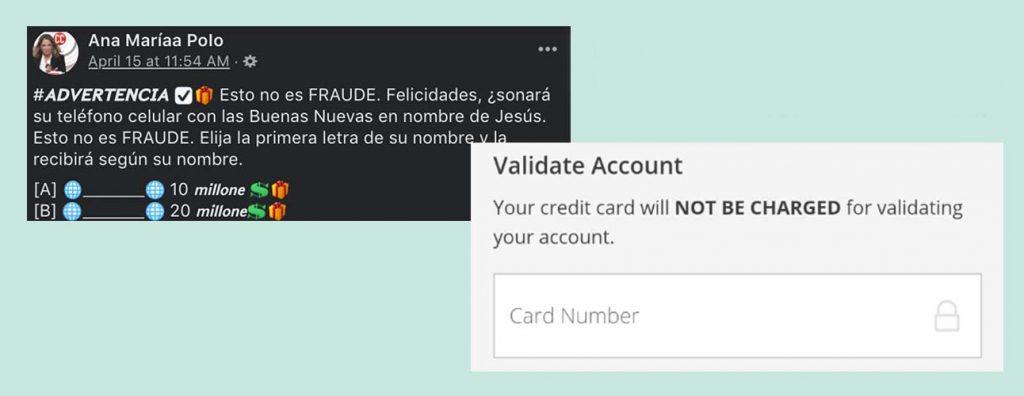
“When you click on the links, whether it be through a secure or open network, it’s really easy to steal someone’s data,” said Alberto Casares, VP Digital Risk Protection at Constella Intelligence, a cybersecurity firm.
“There are tools that create campaigns that could be shared via messages… and as soon as a person provides their credentials, the cyberthief can access that information right away,” added Casares.
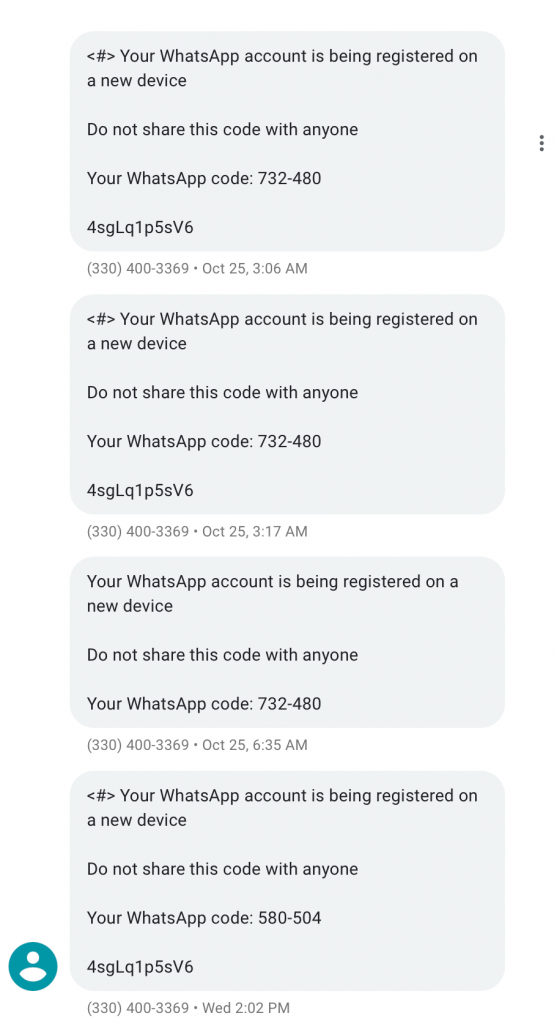
Where do these messages come from?
With the help of a cybersecurity expert, Documented and Telemundo traced the origin of where most of the scams originated from. Documented and Telemundo could not share the names of the websites and organizations in this article as it could promote their fraudulent information.
Three of the sites were registered in the Dominican Republic during the same times that coincide with the launch of federal and state programs or benefits available at that time.
How to avoid these scam messages?
WhatsApp provides different tools to protect the users in their platform from fraudulent messages and desinformation. One of the ways is by providing on their website the contacts of all the IFCN Fact Checking Organizations on WhatsApp, which consists of media organizations, including Telemundo. The user can write part of the fake or suspicious message to the organizations, who will then reply with a “FALSE” message, explaining what is actually happening, along with who fact checked it and when.
The spokesperson also mentioned that the platform introduced the concept of “double arrows” in 2019 to show when a message has been forwarded and shared multiple times and not originated from the user, usually a friend or family member, who sent that message.
“We urge all users to be wary of anyone who contacts them to ask for money, and never to send money to anyone without verifying that it is genuinely that person, even if the phone number is in their contacts,” a WhatsApp spokesperson said.
Immigration lawyer Luis Gómez Alfaro, who has been warning individuals about these types of scams since the dawn of the pandemic, assured Documented and Telemundo that he has seen these types of scenarios previously.
“We have seen identity theft when driver’s licenses became available, where many fell for those messages because they had never participated in public programs before,” said the lawyer during a phone interview.
Gómez Alfaro recommends people report scams or suspicious messages to the platforms they use, given that these social networks have more resources to counter them than the local agencies. Some of the money lost can be difficult to recuperate because the scammers are usually outside of the country, he added.
While it can be hard to take legal action against the individuals or organizations behind the scam campaigns, there are still ways to avoid falling into their schemes. Gómez Alfaro recommended the following:
- If you receive a message from your bank, utility provider, phone network, or any company you trust, do not press on any images they sent, or open any links included. Instead, call or visit the official site directly so that you can verify if the message sent is real or not. (Most scammers will “mask” as recognizable companies to trick people).
- Government programs that offer financial assistance, whether they be federal or state run, are not secret. Always verify with sources that are trustworthy and carry news that are fact checked.
- Be alert: “If something is too good to be true, assume it is too good to be true.”
This story was reported by Rommel Ojeda from Documented, and Juliana Jiménez J. from Telemundo.


